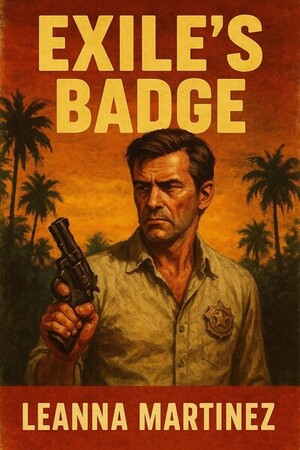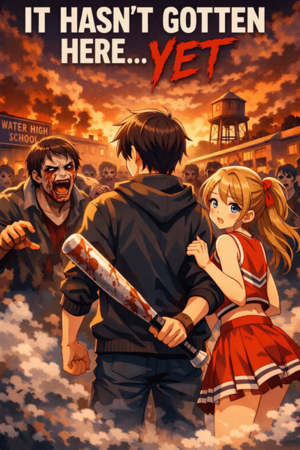Chapter 18:
Anchor in the Storm
Exile's Badge
The work was smaller here. That was the first thing Sam noticed.
Most days began with a call from the station radio about a bar fight that needed breaking up or a drunk fisherman sleeping it off in the market square. The recruits, now his officers, were young, half-trained, and uncertain of themselves, but they responded when Sam spoke. They knew by now he didn’t raise his voice unless he meant it.
By midmorning, he’d walk the streets, revolver snug on his hip, nodding to shopkeepers sweeping dust from their stoops. The air was thick with humidity, always, and smelled of salt, frying oil, and mangroves rotting at the tide’s edge. He’d pause when a child kicked a ball into his path, toeing it back with a faint smile before continuing.
Some of the locals still distrusted him, the outsider, the American. They called him el fantasma, the ghost, sometimes to his face, more often in whispers. But even the skeptical ones seemed to recognize that he was here for more than a paycheck. He kept his officers honest, kept the streets calm. In a town where everyone had learned to expect little, that steadiness was its own kind of miracle.
* * *
The first case that mattered came in the form of a missing girl. Fourteen, last seen walking home from the harbor after dark. The town buzzed with rumors: she’d run away to Belize City, she’d been taken by smugglers, she’d drowned.
The file they handed Sam was barely a page. A name, a grainy school photo, a last known location. The girl’s mother stood in the station, her face hollow, voice shaking with fear, while the officers avoided her eyes. They’d seen this before. Missing girls didn’t come back.
But Sam couldn’t look away.
He started where she’d last been seen, a narrow street lined with shuttered shops and half-dead palms. He walked the route slow, eyes tracking small things: scuff marks in the dirt, a discarded sandal near the drainage ditch, the way the street dogs clustered by one particular alley as though sniffing for something.
Two days of work, quiet questions in markets, a bribe slipped to a dockhand, hours of walking alleys until his boots felt molded to the stone, and the picture sharpened. The girl hadn’t drowned. She hadn’t run away. She’d been lured by one of the smugglers who used the docks to move more than fish.
Sam found her on the third night, hidden in the back room of a warehouse used for offloading crates. She was frightened, but alive. He carried her out, ignoring the shouts of the men who scattered into the dark rather than face his revolver.
When he brought her back to her mother, the woman wept so hard she could barely speak. The girl clung to Sam’s arm until he gently pried her fingers loose.
No one wrote about it. No newspaper carried the story. But the next morning, when Sam walked the market square, the fruit vendor who had once whispered thanks placed a bag of plantains on his desk without charge. Fishermen nodded as he passed. Even the children’s shouts seemed louder, freer.
It wasn’t justice in the grand sense. Caruso still thrived somewhere north, men with money and suits still pulled strings beyond his reach. But here, in this small corner of the coast, one girl had been saved, and for Sam, that was enough.
* * *
The days rolled on. Rainstorms battered the tin roofs, turning the streets into rivers before the sun burned everything dry again. Sam learned the rhythms of the town: when the boats came in, when the bars filled, when the streets grew quiet. His officers grew sharper under his hand. They were less sloppy, less afraid to act.
At night, he still carried the ghosts. Maggie. Emily. The dockhand with his throat cut. Faces that would never leave him. But their voices were quieter now, like distant echoes. He carried them, but they no longer crushed him.
One evening, after filing the day’s reports, Sam walked home through the market square. The vendors were closing up, lanterns flickering against the humid dark. His revolver was heavy on his hip, but for once it didn’t feel like a burden. It felt like part of him, steady, certain.
He paused at a corner storefront. It was empty now, its shutters chained, dust gathering on the glass. Something about it caught his eye, though he couldn’t say why. Maybe the way it faced the square, the way the windows caught the last orange of the setting sun. He stood there a long moment, listening to the sea murmur beyond the town, before moving on.
The next morning, an officer knocked on his office door, hat in hand. He was young, nervous, shifting his weight as though delivering bad news.
“Chief,” the officer said, laying a folder on the desk. “Application came through. Private investigator wants to set up shop in town. Needs your approval.”
Sam raised an eyebrow. “An investigator?”
The officer nodded. “American woman. Name’s Sanchez.” He hesitated, glancing at the file. “Jessica Sanchez.”
The name landed like a spark in Sam’s memory. He sat back slowly, cigarette halfway to his lips. He’d heard it before years ago, during late nights when he’d nursed a drink in front of a television, watching Olympic coverage. Sanchez, the heptathlete. Silver medal. She’d been young, fierce, carrying herself with the same steadiness he recognized in himself now.
He opened the file. The application was straightforward, her handwriting sharp and unflinching across the page. She wanted to call it Black Orchid Detective Agency.
Sam read the name again, then set the papers down. For a long moment, he just sat there, listening to the ceiling fan click overhead, the weight of the ghosts pressing close but not suffocating.
Jessica Sanchez.
The world had a way of circling back on itself.
Sam reached for his pen.




Please sign in to leave a comment.